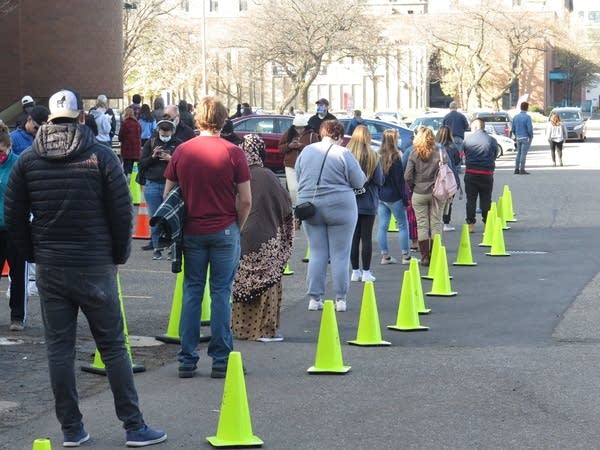Private money helped pay to conduct Minnesota’s election

Go Deeper.
Create an account or log in to save stories.
Like this?
Thanks for liking this story! We have added it to a list of your favorite stories.
Minnesota’s election directors say private money fueled by donations from Facebook CEO Mark Zuckerberg helped them successfully execute an election threatened by safety concerns amid the coronavirus pandemic, an avalanche of early arriving ballots, and President Donald Trump’s repeated attempts to undermine the legitimacy of voting by mail.
The Chicago-based nonprofit Center for Tech and Civic Life delivered grants to election offices in more than 2,500 jurisdictions across the country — including 28 Minnesota cities and counties.
Where the grants went
The Center for Tech and Civic Life awarded grants to more than 2,500 jurisdictions across the country. In many states, elections are administered at the county level, but in Michigan, Wisconsin, and many New England states, elections are run and funded by cities, towns, or townships.
Notes: Eighty-six towns or townships in Michigan and Wisconsin are not shown because there are multiple jurisdictions with the same name in these states and the source data did not specify which one received a grant. In addition to the local grants, a few state election administrators, such as those in North Carolina and Pennsylvania, received grants.
Source: Center for Tech and Civic Life, grant applications and agreements from local election officials.
Zuckerberg and his wife, Priscilla Chan, gave $350 million to the group because they said they wanted a safe and secure election during the COVID-19 pandemic.
APM Reports reviewed more than 30 grant agreements and interviewed more than 25 election directors from Minnesota and other swing states. It found that most of the grant money was spent to help election workers stay safe and process mailed ballots. But the agreements show how much help election workers needed to manage an election during a pandemic that led to an avalanche of mailed ballots.
Turn Up Your Support
MPR News helps you turn down the noise and build shared understanding. Turn up your support for this public resource and keep trusted journalism accessible to all.
For example:
Minneapolis officials spent $300,000 to rent 70,000 square feet of space at the Minneapolis Convention Center because they needed room to process absentee ballots.
Dakota County spent $350,000 of its grant money on temporary workers and overtime.
Ramsey County spent $200,000 on envelope packets for mailed ballots.
Minneapolis election director Grace Wachlarowicz rented the convention center space because she needed to safely socially distance the staff needed to process and count more than 170,000 ballots that arrived through the mail or early in-person voting before Election Day. The city received $2.29 million from the nonprofit.
“Without this grant, we would not have been as successful as we had hoped, during this very challenging year,” Wachlarowicz said. “This funding enabled us to actually administer the election under the COVID-19 pandemic.”
The private money was needed after the federal government failed to adequately fund election efforts during the pandemic. In March, Congress allocated $400 million for states and local governments to use for their elections, but it was a fraction of what some officials said they needed. After Congress didn’t provide a second round of funding, Zuckerberg stepped up to funnel money through the Center for Tech and Civic Life to help with election administration.
Matthew Weil, director of the elections project at the Bipartisan Policy Center, a Washington, D.C., think tank that studies elections, said private grants are necessary if government funding for elections isn’t enough to cover costs.
“Working more with less eventually doesn't work at some point. And there's things that we have to buy, to provide the election process that Americans expect,” Weil said.
The grants to Minnesota’s cities and counties covered a wide range. Ramsey County bolstered its voter outreach and increased personnel with its $2.7 million grant. The city of Sauk Rapids received a modest $5,000 but used the money to purchase personal protective equipment for election workers. Dakota County received a $613,000 grant and bought a folder/stuffer, automated letter opener, a ballot scanner and two ballot-on-demand printers to help process absentee ballots.
The Center for Tech and Civic Life declined repeated interview requests to discuss the grants and how the money was used, but a statement on the nonprofit’s website said the money was designated for election security purposes.
Conservative groups allied with Trump in Minnesota and across the country have criticized the grants. The Minnesota Voters Alliance sued to prevent Minneapolis from spending the grant money. The group alleged that the nonprofit was aiming to boost Democratic voter turnout for Joe Biden despite grant money also going to areas that supported Trump in 2016. In October, a federal judge denied the group’s request to forbid Minneapolis from spending its grant.
While election officers across the country said the grants helped them avert an election meltdown, some observers worry about relying on private money to fund elections in the future. For example, Zuckerberg may be trying to help his image at a time when Facebook is being criticized for how it handles misinformation.
“It's really important that it's a one-time thing,” said Rachael Cobb, an associate professor of political science and legal studies at Suffolk University in Boston. Cobb said the private money was critical this year “but over time, it in and of itself is corrosive.” She said continuing to use private money for such purposes “sullies [the election] in a way that we don't need it to be sullied at all.”




